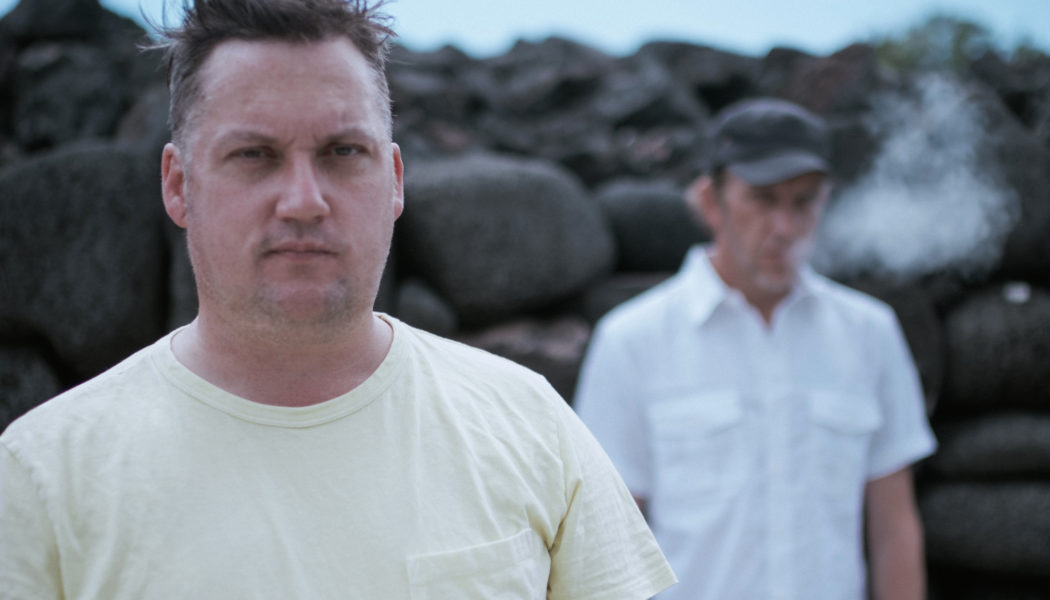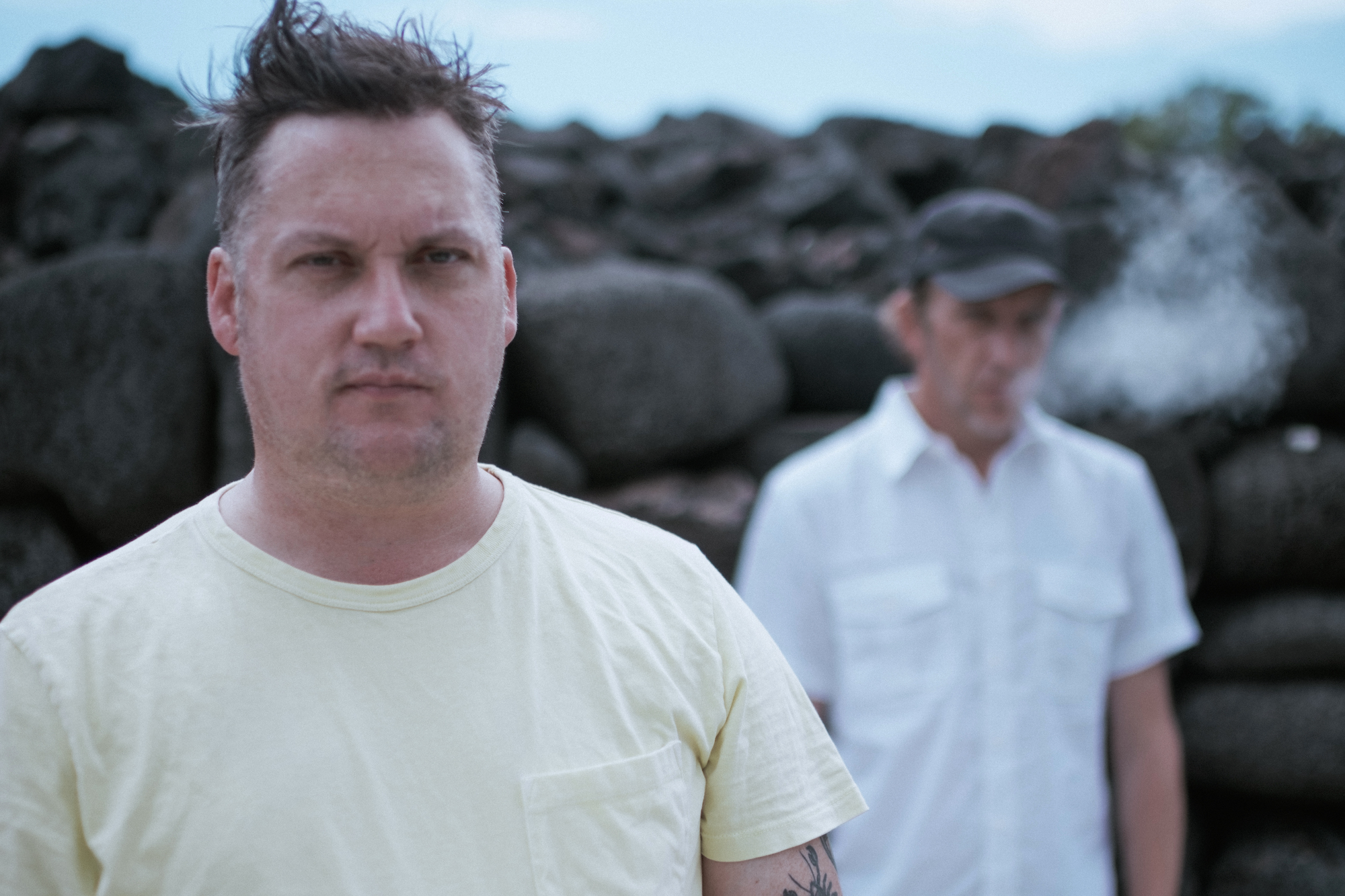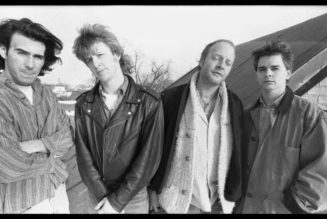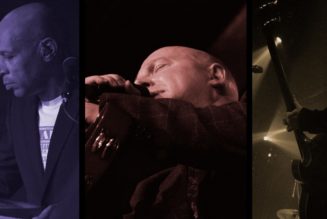Isaac Brock is talking about the epiphany he had from the moment he became a musician.
“From the inception of this band, there’ve been some pretty wobbly moments,” the Modest Mouse vocalist and guitarist admits. “There were moments where no one considered us fucking good … But I know what I like.”
To suggest that the greatest screw-you towards anyone who attempts to push you down is to just live your life with emphatic passion and make the damn art anyway requires guts. The unapologetic kind. The archives of indie rock history are packed with songs lamenting the fate of the artist’s journey – an in-between channel where a quest for stories either frees us to create our own, or tethers us to our past.
Brock intimately understands this state of mind while pacing around his warehouse studio at noon. “You could build the nicest cynical castle you want,” he laughs. Familiar and dizzying, both Brock and the twelve songs of Modest Mouse’s latest seventh-studio album, The Golden Casket (out on June 25 via Epic Records), invites listeners to the most topic-shifting hyperjump. From global warming to fatherhood, balancing the hope for the future he’s found in his growing family with his “tinfoil hat” experiences of gang stalking and UFOs: It’s the Modest Mouse fun-house mirror reflecting your deepest fears while showing you a way out. Complex compositions transition from layered electronics and polyrhythms to anthemic vocals that both linger and waft away like smoke. Brock keeps The Golden Casket on a controlled tilt.
SPIN spoke with Brock to share the artistic resonance of fatherhood, shamans, the concept of “aware-anoia,” and much more.
SPIN: As someone who became a parent for the first time during the pandemic, I really connected with “Lace Your Shoes,” a song about fatherhood that sits in the midst of an album with more chaotic themes. The sentiment “And I hope there’s still something left for you/ I can’t wait to see which paths you choose” feels emotionally earned. Was it challenging to blend sentimentality into the rest of the mix?
Isaac Brock: I just kept thinking, “Is it safe?” But at the same time, if I didn’t sing about it, I might not be singing about the most important events in my life over the last few years. It was a necessity, but was it ill-advised? Time will tell. I just couldn’t get away without it. I’m trying not to direct my mind towards overt cynicism, even though all the material’s there. There’s just so much good shit out there to be a cynic. But as someone who chose to bring people into the world, knowing full well that the wheels are pretty wobbly, it kind of creates a situation where I feel not just responsible for my kids, but I feel responsible for other people’s kids. I feel responsible for somehow making the ride more comfortable for everyone.
There are certainly streaks of hope in this record. How natural does that duality feel for you?
That’s a tricky one, but I’m probably equally as troubled, but more hopeful. The insurmountable problems seem slightly more insurmountable. Any information that comes my way now, how shit’s going for the oceans, how quickly technology is controlling our being, it’s moving at a clip faster than we’re even told. Tomorrow’s fucking problems are here today. But I feel more like throwing my shoulders back and just dealing with it face on. I can act nihilistic about my own self, but I can’t do it about kids. I have a 19-year-old, so my head was already there for the most part, but I feel extra engaged now that I’ve got babies again.
I couldn’t agree more. If there’s a hint of shittiness in the air, it feels like it might ooze onto and over my twins. That heightened focus can lead to a sense of paranoia–but the negative connotations that come with that word make me uneasy.
Maybe we say aware-anoia. Just being aware.
Between “We’re Lucky” and a line on “Making Plans” where you say, “You just being here being you is enough for me,” it feels like you were taking a new direction with that emotionality.
You’re right, I don’t know that it would be a different direction for me personally, but I hadn’t leaned too much into it in my songwriting. The moment that repeated phrase came into my head was the moment it became clear to me. I was trying to quit smoking, and someone had suggested I do ibogaine. It’s an African bark and it’s a psychedelic. A shaman can take you through this “meet the universe” situation. They warned me, like, “People get really emotional. Sometimes they actually get violent. You never know which way it’s going to go.” But instead, all the sacred geometry started showing up in my mind [laughs], and I just realized how much I loved my family and friends, and how the most value is just getting to be here with everyone.
The fact that that is at the core of who you are is pretty special.
That feeling, that sentiment is available to everyone.
That reminds me of “The Sun Hasn’t Left”, which cleverly plays with the concept of observer and subject, self and audience.
Definitely, but the origin is actually kind of the flip side of the coin. That song lyrically came to fruition because the sky was basically blacked out here from forest fires, and everyone was experiencing the pandemic. I was doing pretty good [personally] because I’m in baby jail. I had my family, so being locked in for a pandemic wasn’t completely different than what was going to happen without a pandemic. But for so many people I knew, everyone was just so worried and so sad. I had to find some way to check that reality. What if everyone decided shit was going good? Would that psychic energy create a better situation? Could be bullshit, could not be, but doesn’t hurt to try.
Speaking of aware-anoia, I quite like how your interest in audio surveillance led you to utilize some unusual microphones for the record. Your techniques were matching your themes. What inspired you to incorporate those tools?
Well, two prongs on this one–or maybe three! I’ve been learning forensic audio. Don’t put a tinfoil hat on me yet, but I’ve been learning all this weird forensic audio software, the scary, scary stuff that the government uses. I learned about directed energy weapons, stuff like that. There’s a lot to talk about here, but this might not be the place to talk about it. But that mic was part of learning all of that. It can pick up crazy sounds. Like if you drop a quarter, you can keep shifting down how many hertz you can get it, and it gets really deep and low, and it has all the detail. It’s a wild tool. It’s not water slide fun, but it’s science fun.
What was it about this specific moment that drew you into technology and aware-anoia and science fun?
Honestly, I had three prominent stalkers. One of them got arrested for lighting the security cameras on my porch on fire. There’s another one who I won’t even mention any of the details, but he went to jail for a while. And then there was another one. He was very, very interesting. He at some point basically drew my attention to the fact that I was not only being stalked by him. The reason that he thought I was so fun to stalk was that other people were following me. I’m going to keep this brief, but are you familiar with gang stalking?
No, I feel so naive. I don’t know any of this stuff.
It’s also called cause stalking or street theater. It’s fascinating shit. I think Vice had a couple of documentaries [on the subject], but they’re not that good. It’s hard to get good information on it because of how it’s done. It’s designed to make people look paranoid. It plays on having normal shit done by a bunch of people. Like, “Every third person I walk by winks at me, or stops and pulls their ear,” or something like that. You sound crazy, but there it is. I started doing all this videotaping, and found multiple people were following me. The same car, the same place.
It’s been a year and a half since I’ve actually had solid gang stalking, but just the other day, I was driving to rehearse with our new guitarist. I was listening to a book on tape [when I got there] and I wanted to finish my chapter. So I just pulled up and I parked. Right after I did, some guy pulled up on a BMX, parked across the street, and looked at his phone–normal shit. But then he stayed there the whole time I was in the car. And I’m like, “Why is this guy just parked here? It just makes no sense. There’s nothing there. It’s a parking lot.” And he just sat there and waited. And when I got out–and I have this on my security cameras–he made sure he adjusted and moved his whole body so that I couldn’t get a look at his face. Then I go inside and he holds his cell phone camera up so that he can see if there was anyone on the roof. Anyways, it’s a spiral that I could go on and talk about for a long time.
Whether or not one believes in it, it’s your experience and it sounds terrifying. How have you been able to still find the ability to work and write?
I used it to help write. At the point when I was writing, the physical gang-stalking had stopped, but it did feel like I was what is called a targeted individual. It’s basically just a bunch of tinfoil hat shit, but time will tell.
If it’s your authentic experience, I don’t think you need to diminish it in that way.
I diminish it because until I’m done with my sleuthing until I can actually present enough proof that it’s undoubtable, there’s no reason for me to go into it. It’s like in ’97, when I was on a plane and I saw a UFO. I didn’t tell anyone about that shit until there was a TV show out, and I was like, “Oh, there it is. That’s the sighting.” The Phoenix Lights is a UFO sighting that is the most widely reported in at least US history. It was 1997, I was mastering The Lonesome Crowded West. Now that officials and stuff are coming out like, “Oh yeah, there are UFOs here,” it’s okay to talk about this shit.
My suggestion for anyone who has someone that they care about that is starting to sound paranoid: there’s enough weird shit going on. If anyone ever tells you that they think this is going on, I just say keep a slightly more open mind about it. It might be.
How do you measure your success on artistic decisions?
That’s trickier because it’s a time-honored tradition that anyone who’s record isn’t doing well is just to assume that people only like bad stuff and they’re the good stuff. And if you’re doing really, really well, it’s obvious because everyone likes you and what you’re doing.
For me, there are a few key friends that, if they say something nice about it, then I feel pretty good. From the inception of this band, there’ve been some pretty wobbly moments. There were moments where no one considered us fucking good. I remember my mom trying to talk me into getting into photography or something. But I know what I like. I don’t need other people to tell me what I like. And when I’m making something, I know if I like it. There have been times where I’ve, for one reason or another, pressed the gas on just moving forward on a song that has somehow rubbed me wrong, but is seemingly very likable in a pop way. There’s one–and I’ll spare the people who really like the song from knowing which one it is–but it was a song on Lonesome Crowded West, and people fucking really liked it. And it never sat well with me. I knew I was making a song that I would have given up on early, but people were telling me that that was the one that they liked. I’ve since realized that I would rather not ever put that song on anything. That’s happened a couple of times and it’ll happen again. Feelings about songs, the stakes are fucking low. So why not just feel the way you feel?











